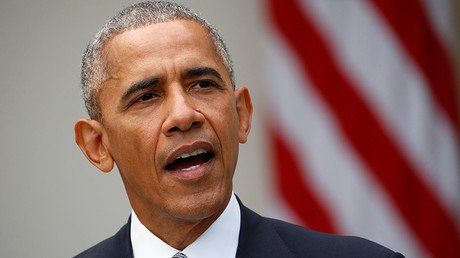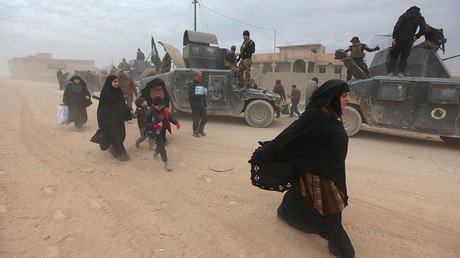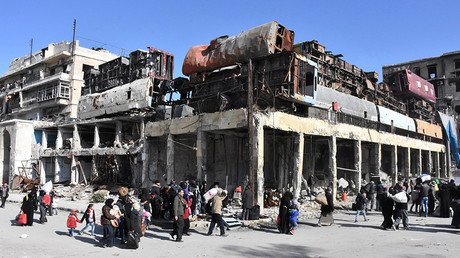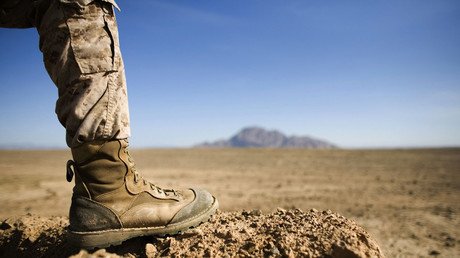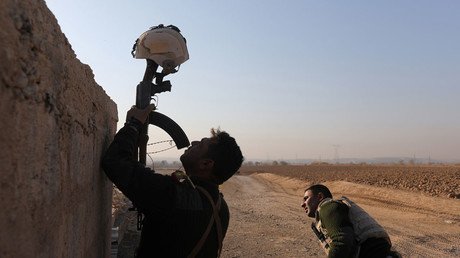Forever war: Obama pulled troops from Iraq 5 years ago, but US military now poised to remain
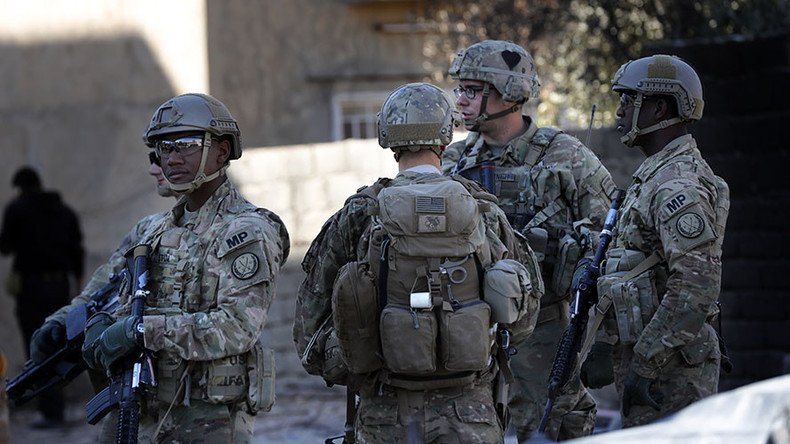
In December 2011, President Barack Obama pulled all remaining US troops from Iraq pursuant to an agreement signed by his predecessor. Yet a new phase of America's military stewardship of Iraq began in 2014 and may remain for years to come.
Five years ago, Obama declared that "our war in Iraq ends this month." The last convoy of US troops exited Iraq in mid-December of 2011, more than a year after the final combat soldiers were allegedly pulled from the war-laden nation that was invaded by the US in 2003.
Prior to the withdrawal, the Obama administration had attempted to convince Iraqi officials to allow US military bases in Iraq and to offer US forces legal immunity from Iraqi law following the exit. Iraq refused these requests, though the US embassy in Baghdad and two consulates were allowed to remain, as well as at least 4,000 defense contractors.
This final troop withdrawal, almost nine years since US airstrikes began the Iraq invasion, marked a "success" for the United States, Obama told troops at Fort Bragg on December 14, 2011.
"We knew this day would come. We've known it for some time. But still there is something profound about the end of a war that has lasted so long," Obama said. "It's harder to end a war than begin one. Everything that American troops have done in Iraq - all the fighting, all the dying, the bleeding and the building and the training and the partnering, all of it has landed to this moment of success."
Obama insisted that the US was "leaving behind a sovereign, stable and self reliant Iraq."
In pulling all, or most, military personnel from Iraq, the Obama administration was following through on the Status of Forces Agreement (SOFA) signed by then-President George W. Bush and then-Prime Minister Nouri Al-Maliki of Iraq on December 14, 2008, the same day an Iraqi journalist threw a shoe at Bush's head.
"There is still more work to be done," Bush said upon signing the SOFA in 2008. "The war is not yet over -- but with the conclusion of these agreements and the courage of the Iraqi people and the Iraqi troops and American troops and civilian personnel, it is decisively on its way to being won."
From the invasion of Iraq in March 2003 through the end of 2011, about a million US military personnel were deployed to Iraq; nearly 4,500 were killed and more than 32,000 were wounded. Hundreds of thousands of Iraqis died due to the invasion and subsequent war, though estimates vary.
Iraq remained a cauldron of violence, with sectarian warfare spiking around November 2013, when more than 900 deaths occurred, according to the Iraqi government. The United Nations estimated that more than 7,000 civilians were killed as a result of fighting in 2013, more than double the previous year and the most in Iraq since 2008.
An Islamist presence established in Iraq upon the US invasion eventually coalesced in part to form jihadist group Al-Qaeda in Iraq. By 2013, AQI had morphed into the Islamic State of Iraq and the Levant (ISIL or ISIS, now known as Islamic State). That year, IS seized Mosul, Iraq's second largest city, while also controlling much territory in the nation's north and east.
The rise of IS in Iraq, as well as in Syria, triggered a new US-led military mission in Iraq, Operation Inherent Resolve. In August 2014, the US and an international coalition of nations began airstrikes allegedly aimed at weakening IS-controlled areas and the group's infrastructure.
As of December 2, the US and coalition partners had conducted more than 10,500 strikes in Iraq and 6,000 in Syria, according to the Pentagon. The United States is responsible for about three-fourths of the total airstrikes, including 7,183 in Iraq. Total cost for Operation Inherent Resolve has eclipsed $10 billion.
The US has gradually increased ground troop levels in Iraq, with the current count at around 6,000. Many are billed as advisors, trainers, and support systems for Iraqi security forces. Since October, Iraqi forces and the US-led coalition have sought to retake Mosul from IS control. The offensive on Mosul, however, has proved difficult despite the coalition’s overwhelming numerical and firepower superiority.
US secretary of defense Ash Carter said this month that it is "certainly possible" that the "tough fight" to retake Mosul will occur before President-elect Donald Trump takes office on January 20. Yet, a week prior, Rupert Jones, Britain’s most senior commander in Iraq and deputy commander of the US-led coalition in the region, called for "patience," saying that there is no deadline for establishing control of Mosul as civilian and military casualties continue to mount.
“They [the US-led coalition] probably realize that the thing in Mosul is not going to be very successful,” retired US Air Force Lieutenant Colonel Karen Kwiatkowski told RT last month.
With a change in presidential administrations on the horizon, Carter has suggested an enduring US presence in Iraq seems likely, even if IS is expelled.
"But there will still be much more to do after that to make sure that, once defeated, ISIL stays defeated," he said earlier this month at the Reagan National Defense Forum. "We'll need to continue to counter foreign fighters trying to escape and ISIL's attempts to relocate or reinvent itself. To do so, not only the United States but our coalition must endure and remain engaged militarily."
Since taking office in January 2009, President Obama has overseen a vast expansion of Bush's "global war on terrorism," including targeted-killing campaigns with the use of armed, unmanned drones. In a presidential memorandum released on December 5, the White House said the US military operations around the world are grounded in the October 7, 2001, Authorization for the Use of Military Force (AUMF), by which Congress approved military operations and counterterrorism combat operations against Al-Qaeda and vaguely-defined "associated forces" following the attacks of September 11, 2001. Since August 2014, those "associated forces" have expanded to include operations against Islamic State and, more recently, Al-Shabaab in Somalia, among other groups.
